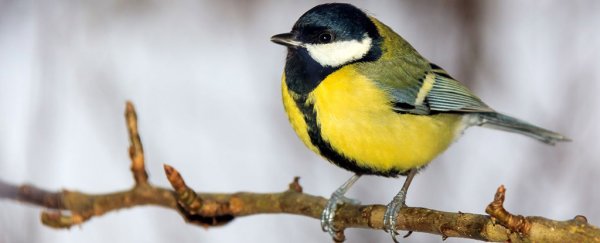A little bird common in the United Kingdom is identical in almost every way to its counterparts across the North Sea in the Netherlands: Black and yellow feathers, splotches of white across the cheeks.
But the British ones have slightly longer beaks, scientists say, and the reason might be British humans' embrace of bird feeders.
In a study published Thursday in Science, researchers report that great tits in the United Kingdom evolved to have lengthier bills in a matter of decades.
The longer the beak, the easier the access to food in the hanging backyard buffets popular in Britain - and, the data show, the healthier the offspring: Longer-beaked birds produced more chicks that fledged.
The researchers came upon this example of rapid, possibly human-driven natural selection by starting not with the birds' beaks, but with their DNA.
Both Britain and the Netherlands are home to great tit populations that have been studied for many years, and the team suspected that the birds' genes might hold clues into whether they've evolved differently.
"What we wanted to do in the great tits was say, 'Can we see signatures of natural selection in the DNA and then can we relate that to actual individual-level differences?'" said Lewis Spurgin, an evolutionary biologist at the University of East Anglia.
Although the whole idea of natural selection started with variations in the beaks of Charles Darwin's finches, Spurgin says the team "really didn't expect it would be at all about beaks."
But after sifting through the genomes of nearly 3,000 birds, the researchers spotted some distinctive sequences. The related genes in humans, they discovered, control face shape. What's more, the areas where differences popped up were associated with beak shape in Darwin's famed finches.
"So we're thinking, 'Well, this looks like a beak thing here,'" Spurgin said. "What that told us was that the same bits of DNA that control beak length are actually under natural selection."
Further evidence followed. Measurements dating to the 1970s showed that the U.K. great tits' beaks had increased in length by about 0.2 millimetres, Spurgin said - a small but "observable" difference. The birds with the longer-beaked gene variants successfully raised about one more chick every five years than those with the short-billed variants.
"The assumption would be that if you have a longer bill and are better able to access food, then you are in general in better condition and better able to invest more in your fledgling," Spurgin said.
Finally, little radio tags on the birds beamed out signals every time they visited feeders at the study sites. And, sure enough, those with the longer-billed gene variants - and those with physically longer beaks - spent more time at these avian restaurants.
So are the bird feeders behind all this? Spurgin is quick to point out that it's only a hypothesis. Something in the Dutch habitat might be different from that in Britain, he said, or perhaps the distinct beaks have to do with song, he said.
But previous research has suggested that bird feeders might be driving selection for longer beaks among birds called black caps that spend their winters in the United Kingdom, he said.
And as the study notes, Brits adore their birds: More than half of their gardens are believed to host a feeder, and the United Kingdom spends twice as much on bird seed annually as all of mainland Europe, according to some estimates.
"Humans are causing animals to evolve in lots of ways, many of which we probably don't understand," Spurgin said. "It's going to be a really interesting area for future research."
2017 © The Washington Post
This article was originally published by The Washington Post.
